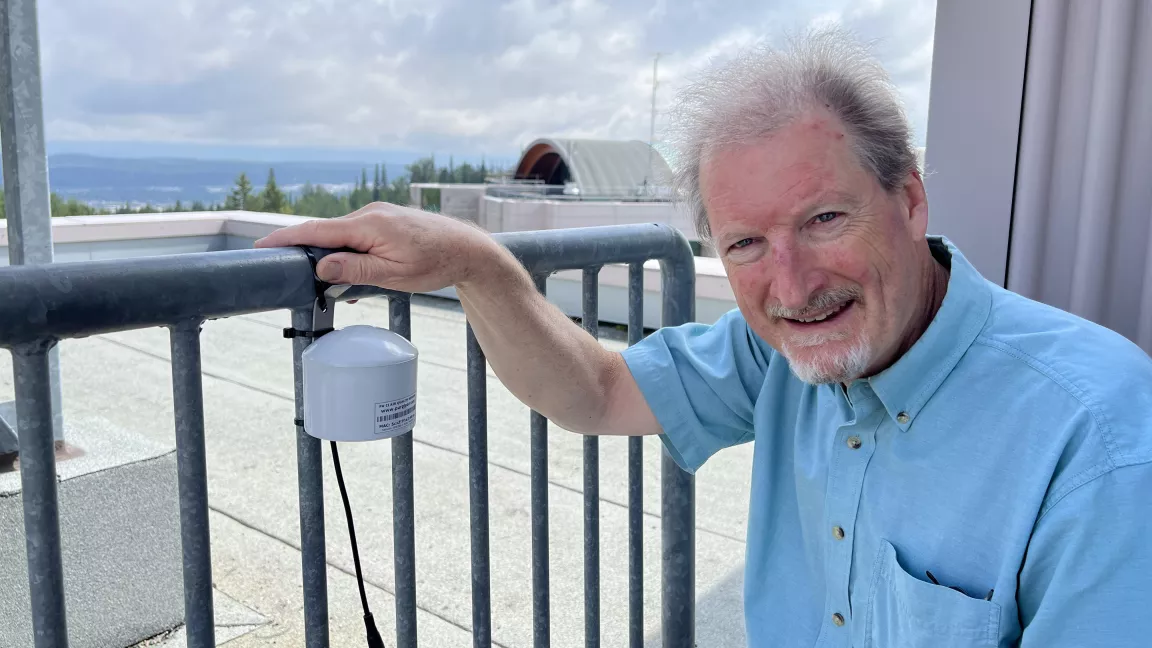Crowdsourcing air quality
UNBC researchers, in partnership with Environment and Climate Change Canada, created a national air quality map with the help of hundreds of citizens who installed low-cost, internet-enabled air quality sensors at home.

An interactive online map developed by UNBC researchers in collaboration with Environment and Climate Change Canada (ECCC) is making it easier for Canadians to monitor the air quality in their communities and is helping scientists determine what steps are needed to ensure our air is cleaner.
Faculty of Environment Professor Dr. Peter Jackson led the project that integrates data from both regulatory monitors, maintained by governmental bodies, and low-cost monitors that participating people put up at their homes. The resulting map provides real-time data on the amount of fine particulate matter in the air (PM2.5: particles 2.5 microns in diameter or less) at hundreds of locations across the country, providing a comprehensive look at air quality. The affordable sensors empower communities to actively participate in data collection and provide invaluable insights into local air quality conditions.
“Previously, to get accurate measurements of fine particulate matter, you would need to purchase a $30,000 monitor and have a technician look after it,” Jackson says. “Now you can buy a $300 monitor that is plug and play. It’s not as accurate but it’s still very good."
Jackson partnered with ECCC to expand the reach of the project across the country. He says the collaboration was a natural fit as ECCC has specific resources and expertise not available at UNBC.
“It’s a mutually beneficial relationship,” Jackson says. “In Canada, we are too small not to cooperate and collaborate across the university, government and private sectors, especially in relatively small fields like atmospheric science.”
Brayden Nilson, who recently defended his thesis for a Master of Science in Natural Resources and Environmental Studies, played a crucial role in the development of the map both during his time as a student as well as when he worked with Jackson as a research associate. His passion for air quality research grew during an upper-level course with Jackson when he was an undergraduate student in the Bachelor of Science, Environmental Science program.
“I was also drawn to the rapidly expanding field of air quality. Air pollution is a silent killer that has only recently become something people are concerned about,” Nilson says. “My interest has only grown the more experience I get, especially with wildfires increasing in frequency and intensity across Canada every year.”
This summer’s busy fire season has brought increased attention on the negative impacts of poor air quality. ECCC offers resources about the effects of wildfire smoke on human health and what people can do to protect themselves in smoky conditions.
The periods of poor air quality have brought more attention to the map, including the features that allow users to overlay data on current fire conditions.
"We are getting a lot of attention in Quebec recently – from environmental health practitioners there who make use of the map,” Jackson says. “I think they appreciate that it is in French too."
Nilson is now working for ECCC and is grateful for the research opportunities at UNBC. As an undergraduate student he co-authored a journal article with Jackson and four other students about air quality in Prince George. His master’s research focused on improving the quality of the data from air monitoring sensors.
“It is an amazing opportunity to get experience within your field and to make connections before you get out into the competitive job world,” Nilson says. “All of the students I know who partook in undergraduate research have exceled because of it, many of whom continued on to higher education or dream jobs thanks to the relationships they built along the way.”